Entrepreneurial Ventures: Types, Impact, and Analysis Report
VerifiedAdded on 2023/01/10
|18
|4957
|57
Report
AI Summary
This report delves into the realm of entrepreneurial ventures, providing a comprehensive overview of various types, including serial entrepreneurs, intrapreneurs, owner-managers, survival entrepreneurship, lifestyle entrepreneurship, aggressive growth entrepreneurship, corporate entrepreneurship, and social entrepreneurship. It examines the similarities and differences between these ventures, highlighting factors such as profit generation, innovation, and scope. The report further analyzes the significant impact of micro and small businesses on the economy, particularly in the UK, detailing their contributions to employment, turnover, and overall economic growth. Additionally, it explores the crucial role of small businesses and startups in fostering social economy by providing employment, promoting environmental sustainability, and driving innovation. The report concludes by emphasizing the importance of understanding different entrepreneurial venture types for success and the impact of small businesses on the economy.

Entrepreneurial Ventures and
Exploration of the
Entrepreneurial Mindset
Exploration of the
Entrepreneurial Mindset
Paraphrase This Document
Need a fresh take? Get an instant paraphrase of this document with our AI Paraphraser
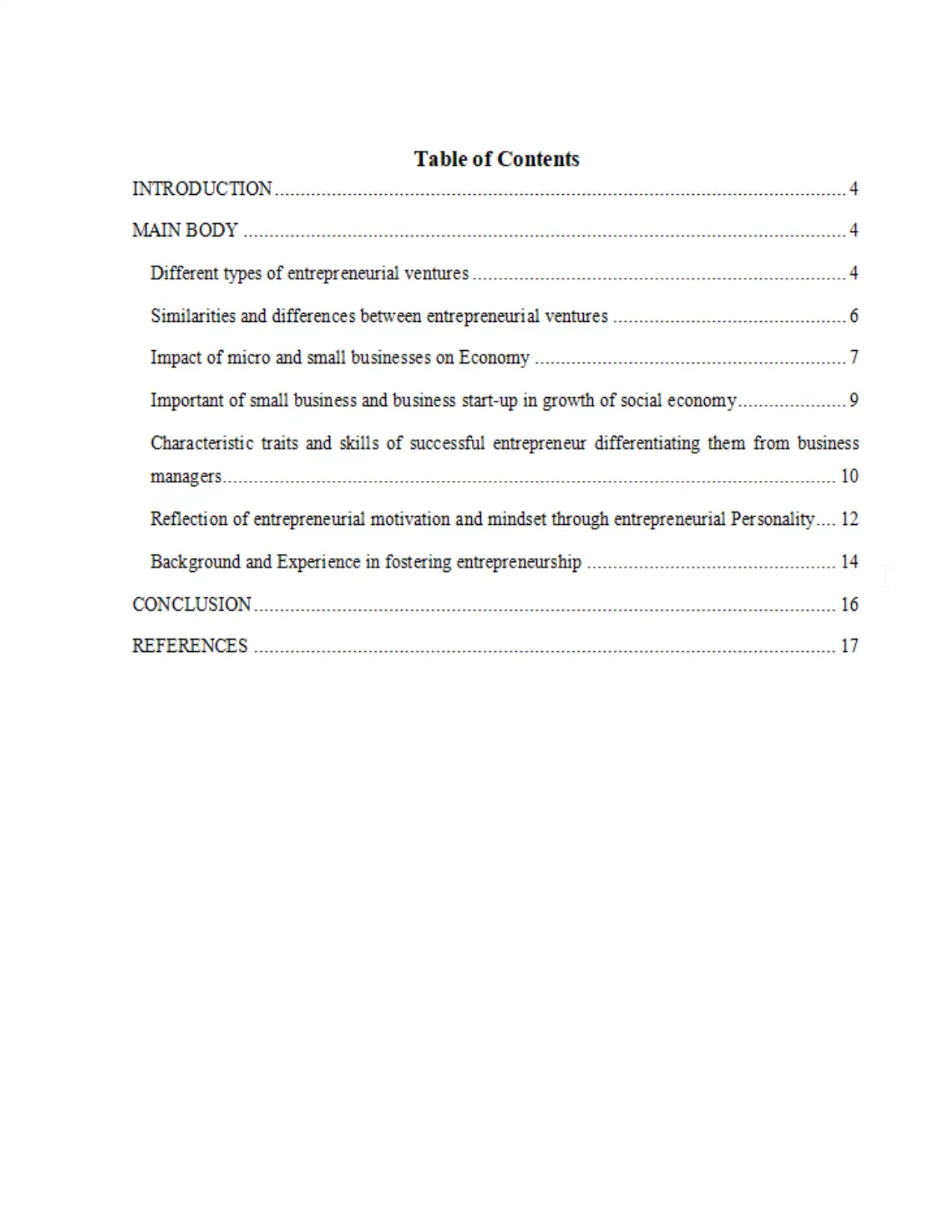
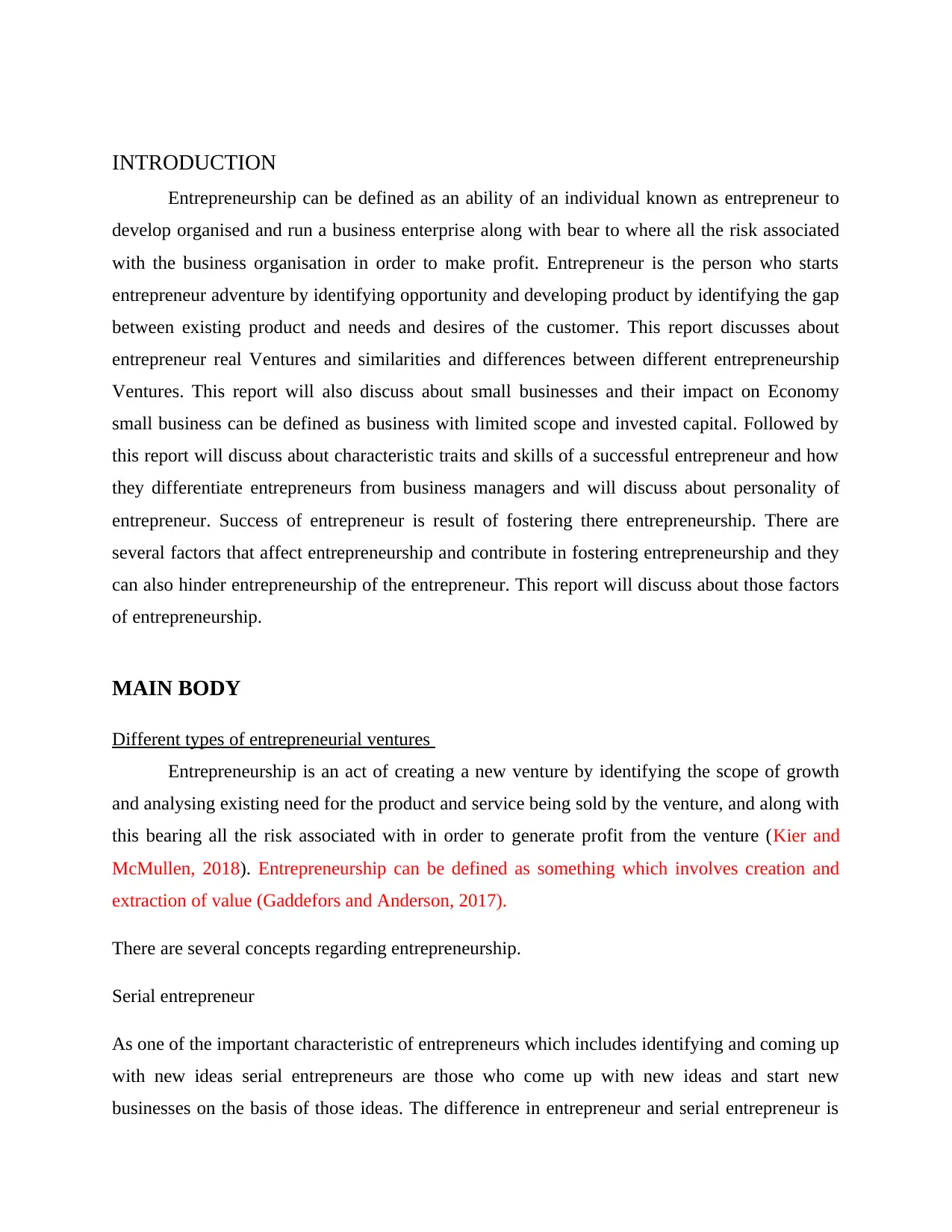
INTRODUCTION
Entrepreneurship can be defined as an ability of an individual known as entrepreneur to
develop organised and run a business enterprise along with bear to where all the risk associated
with the business organisation in order to make profit. Entrepreneur is the person who starts
entrepreneur adventure by identifying opportunity and developing product by identifying the gap
between existing product and needs and desires of the customer. This report discusses about
entrepreneur real Ventures and similarities and differences between different entrepreneurship
Ventures. This report will also discuss about small businesses and their impact on Economy
small business can be defined as business with limited scope and invested capital. Followed by
this report will discuss about characteristic traits and skills of a successful entrepreneur and how
they differentiate entrepreneurs from business managers and will discuss about personality of
entrepreneur. Success of entrepreneur is result of fostering there entrepreneurship. There are
several factors that affect entrepreneurship and contribute in fostering entrepreneurship and they
can also hinder entrepreneurship of the entrepreneur. This report will discuss about those factors
of entrepreneurship.
MAIN BODY
Different types of entrepreneurial ventures
Entrepreneurship is an act of creating a new venture by identifying the scope of growth
and analysing existing need for the product and service being sold by the venture, and along with
this bearing all the risk associated with in order to generate profit from the venture (Kier and
McMullen, 2018). Entrepreneurship can be defined as something which involves creation and
extraction of value (Gaddefors and Anderson, 2017).
There are several concepts regarding entrepreneurship.
Serial entrepreneur
As one of the important characteristic of entrepreneurs which includes identifying and coming up
with new ideas serial entrepreneurs are those who come up with new ideas and start new
businesses on the basis of those ideas. The difference in entrepreneur and serial entrepreneur is
Entrepreneurship can be defined as an ability of an individual known as entrepreneur to
develop organised and run a business enterprise along with bear to where all the risk associated
with the business organisation in order to make profit. Entrepreneur is the person who starts
entrepreneur adventure by identifying opportunity and developing product by identifying the gap
between existing product and needs and desires of the customer. This report discusses about
entrepreneur real Ventures and similarities and differences between different entrepreneurship
Ventures. This report will also discuss about small businesses and their impact on Economy
small business can be defined as business with limited scope and invested capital. Followed by
this report will discuss about characteristic traits and skills of a successful entrepreneur and how
they differentiate entrepreneurs from business managers and will discuss about personality of
entrepreneur. Success of entrepreneur is result of fostering there entrepreneurship. There are
several factors that affect entrepreneurship and contribute in fostering entrepreneurship and they
can also hinder entrepreneurship of the entrepreneur. This report will discuss about those factors
of entrepreneurship.
MAIN BODY
Different types of entrepreneurial ventures
Entrepreneurship is an act of creating a new venture by identifying the scope of growth
and analysing existing need for the product and service being sold by the venture, and along with
this bearing all the risk associated with in order to generate profit from the venture (Kier and
McMullen, 2018). Entrepreneurship can be defined as something which involves creation and
extraction of value (Gaddefors and Anderson, 2017).
There are several concepts regarding entrepreneurship.
Serial entrepreneur
As one of the important characteristic of entrepreneurs which includes identifying and coming up
with new ideas serial entrepreneurs are those who come up with new ideas and start new
businesses on the basis of those ideas. The difference in entrepreneur and serial entrepreneur is
⊘ This is a preview!⊘
Do you want full access?
Subscribe today to unlock all pages.

Trusted by 1+ million students worldwide
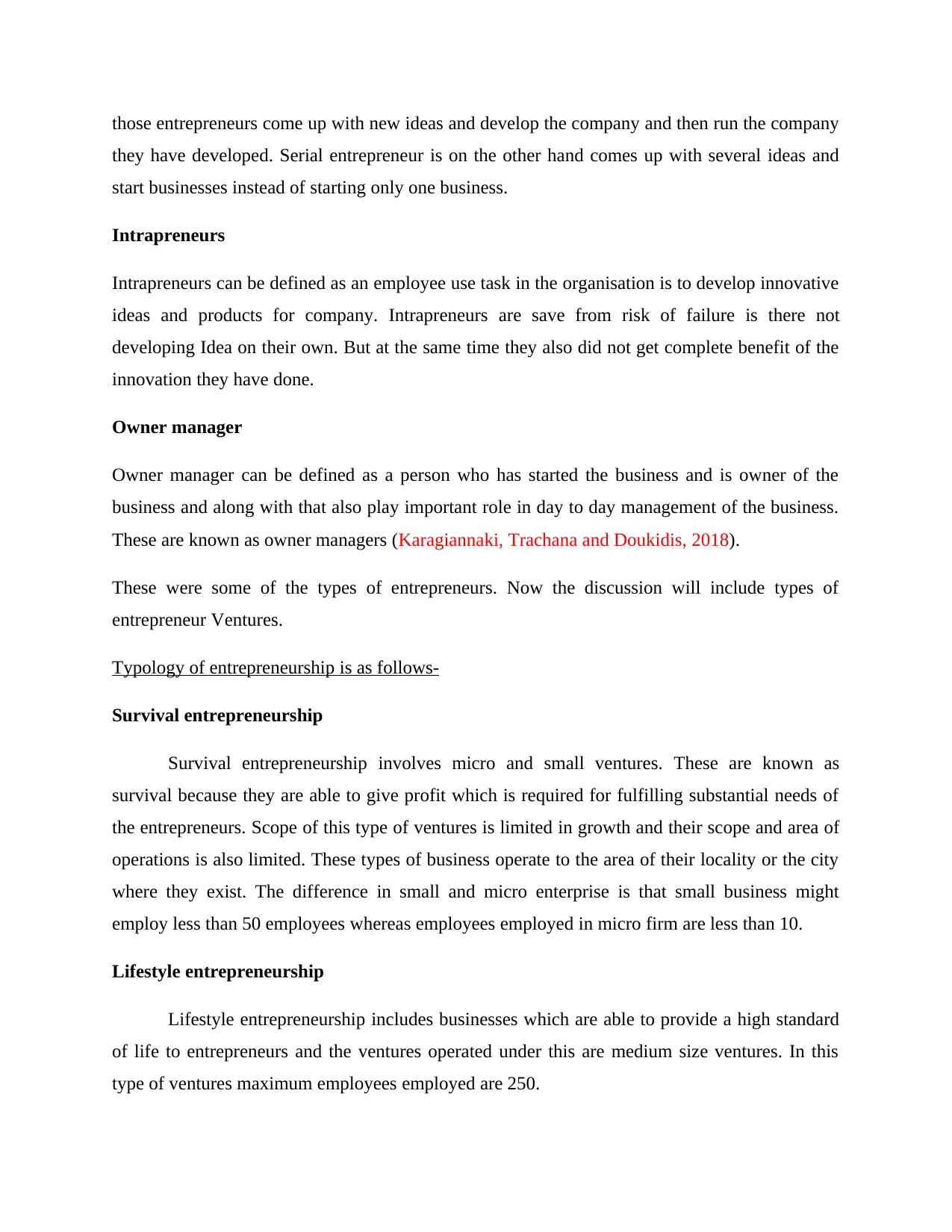
those entrepreneurs come up with new ideas and develop the company and then run the company
they have developed. Serial entrepreneur is on the other hand comes up with several ideas and
start businesses instead of starting only one business.
Intrapreneurs
Intrapreneurs can be defined as an employee use task in the organisation is to develop innovative
ideas and products for company. Intrapreneurs are save from risk of failure is there not
developing Idea on their own. But at the same time they also did not get complete benefit of the
innovation they have done.
Owner manager
Owner manager can be defined as a person who has started the business and is owner of the
business and along with that also play important role in day to day management of the business.
These are known as owner managers (Karagiannaki, Trachana and Doukidis, 2018).
These were some of the types of entrepreneurs. Now the discussion will include types of
entrepreneur Ventures.
Typology of entrepreneurship is as follows-
Survival entrepreneurship
Survival entrepreneurship involves micro and small ventures. These are known as
survival because they are able to give profit which is required for fulfilling substantial needs of
the entrepreneurs. Scope of this type of ventures is limited in growth and their scope and area of
operations is also limited. These types of business operate to the area of their locality or the city
where they exist. The difference in small and micro enterprise is that small business might
employ less than 50 employees whereas employees employed in micro firm are less than 10.
Lifestyle entrepreneurship
Lifestyle entrepreneurship includes businesses which are able to provide a high standard
of life to entrepreneurs and the ventures operated under this are medium size ventures. In this
type of ventures maximum employees employed are 250.
they have developed. Serial entrepreneur is on the other hand comes up with several ideas and
start businesses instead of starting only one business.
Intrapreneurs
Intrapreneurs can be defined as an employee use task in the organisation is to develop innovative
ideas and products for company. Intrapreneurs are save from risk of failure is there not
developing Idea on their own. But at the same time they also did not get complete benefit of the
innovation they have done.
Owner manager
Owner manager can be defined as a person who has started the business and is owner of the
business and along with that also play important role in day to day management of the business.
These are known as owner managers (Karagiannaki, Trachana and Doukidis, 2018).
These were some of the types of entrepreneurs. Now the discussion will include types of
entrepreneur Ventures.
Typology of entrepreneurship is as follows-
Survival entrepreneurship
Survival entrepreneurship involves micro and small ventures. These are known as
survival because they are able to give profit which is required for fulfilling substantial needs of
the entrepreneurs. Scope of this type of ventures is limited in growth and their scope and area of
operations is also limited. These types of business operate to the area of their locality or the city
where they exist. The difference in small and micro enterprise is that small business might
employ less than 50 employees whereas employees employed in micro firm are less than 10.
Lifestyle entrepreneurship
Lifestyle entrepreneurship includes businesses which are able to provide a high standard
of life to entrepreneurs and the ventures operated under this are medium size ventures. In this
type of ventures maximum employees employed are 250.
Paraphrase This Document
Need a fresh take? Get an instant paraphrase of this document with our AI Paraphraser
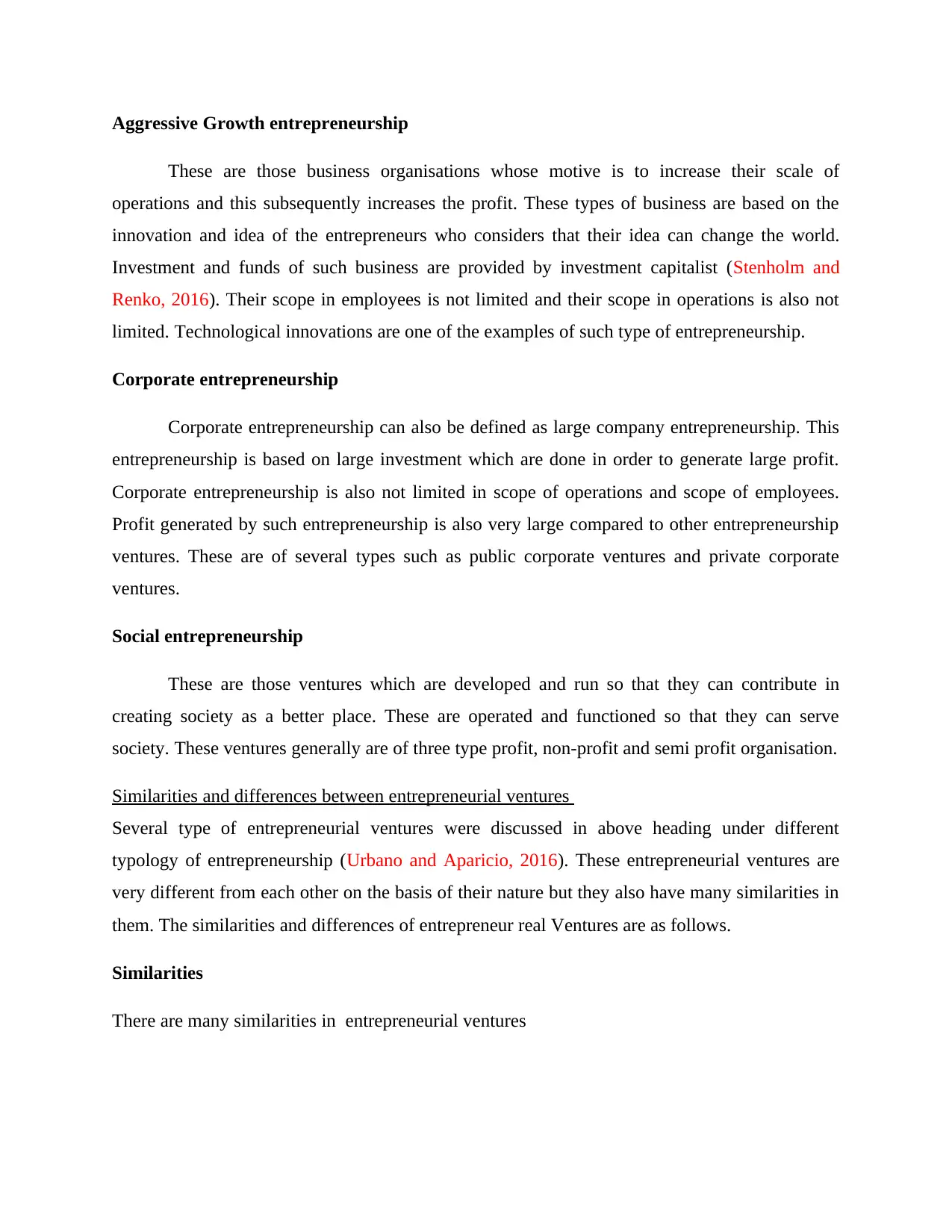
Aggressive Growth entrepreneurship
These are those business organisations whose motive is to increase their scale of
operations and this subsequently increases the profit. These types of business are based on the
innovation and idea of the entrepreneurs who considers that their idea can change the world.
Investment and funds of such business are provided by investment capitalist (Stenholm and
Renko, 2016). Their scope in employees is not limited and their scope in operations is also not
limited. Technological innovations are one of the examples of such type of entrepreneurship.
Corporate entrepreneurship
Corporate entrepreneurship can also be defined as large company entrepreneurship. This
entrepreneurship is based on large investment which are done in order to generate large profit.
Corporate entrepreneurship is also not limited in scope of operations and scope of employees.
Profit generated by such entrepreneurship is also very large compared to other entrepreneurship
ventures. These are of several types such as public corporate ventures and private corporate
ventures.
Social entrepreneurship
These are those ventures which are developed and run so that they can contribute in
creating society as a better place. These are operated and functioned so that they can serve
society. These ventures generally are of three type profit, non-profit and semi profit organisation.
Similarities and differences between entrepreneurial ventures
Several type of entrepreneurial ventures were discussed in above heading under different
typology of entrepreneurship (Urbano and Aparicio, 2016). These entrepreneurial ventures are
very different from each other on the basis of their nature but they also have many similarities in
them. The similarities and differences of entrepreneur real Ventures are as follows.
Similarities
There are many similarities in entrepreneurial ventures
These are those business organisations whose motive is to increase their scale of
operations and this subsequently increases the profit. These types of business are based on the
innovation and idea of the entrepreneurs who considers that their idea can change the world.
Investment and funds of such business are provided by investment capitalist (Stenholm and
Renko, 2016). Their scope in employees is not limited and their scope in operations is also not
limited. Technological innovations are one of the examples of such type of entrepreneurship.
Corporate entrepreneurship
Corporate entrepreneurship can also be defined as large company entrepreneurship. This
entrepreneurship is based on large investment which are done in order to generate large profit.
Corporate entrepreneurship is also not limited in scope of operations and scope of employees.
Profit generated by such entrepreneurship is also very large compared to other entrepreneurship
ventures. These are of several types such as public corporate ventures and private corporate
ventures.
Social entrepreneurship
These are those ventures which are developed and run so that they can contribute in
creating society as a better place. These are operated and functioned so that they can serve
society. These ventures generally are of three type profit, non-profit and semi profit organisation.
Similarities and differences between entrepreneurial ventures
Several type of entrepreneurial ventures were discussed in above heading under different
typology of entrepreneurship (Urbano and Aparicio, 2016). These entrepreneurial ventures are
very different from each other on the basis of their nature but they also have many similarities in
them. The similarities and differences of entrepreneur real Ventures are as follows.
Similarities
There are many similarities in entrepreneurial ventures
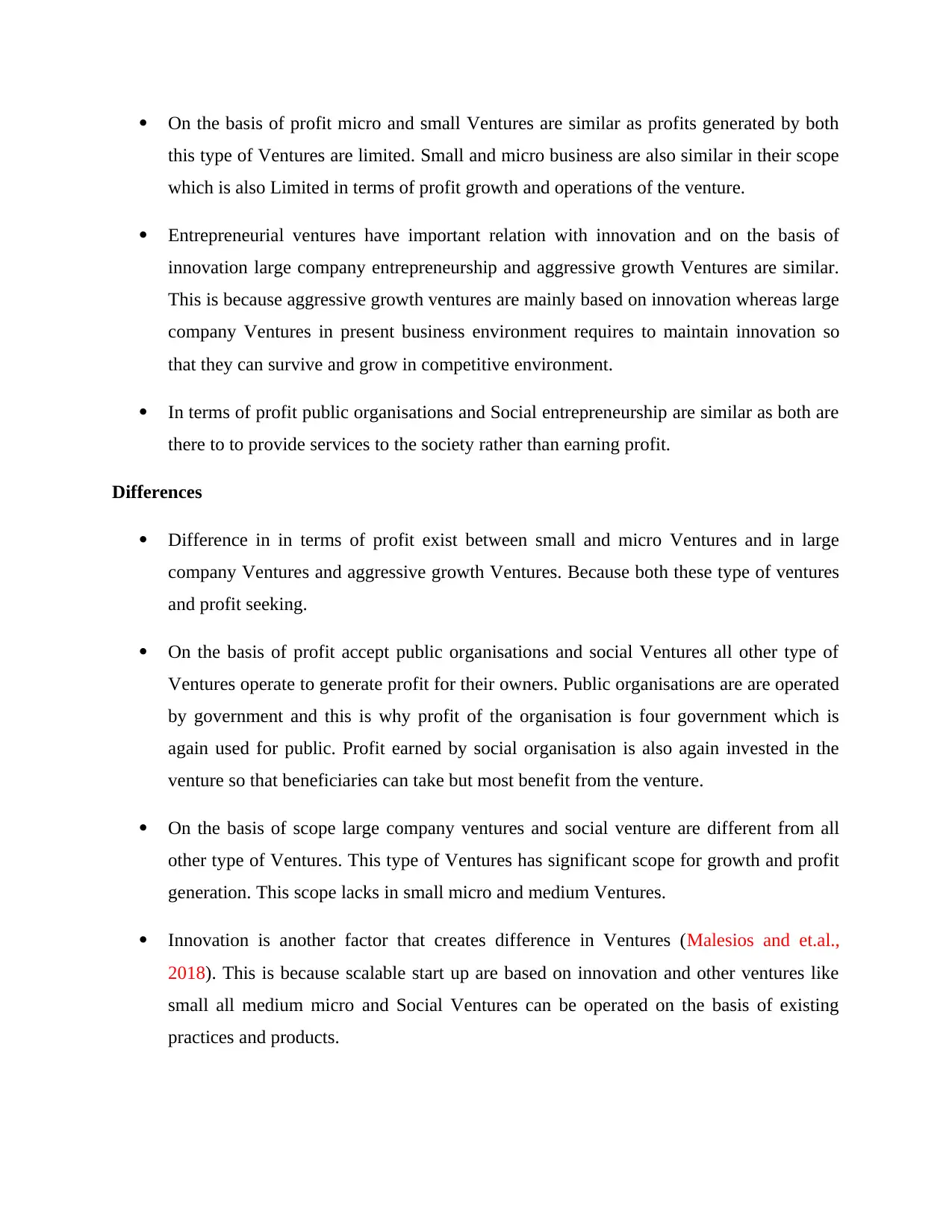
On the basis of profit micro and small Ventures are similar as profits generated by both
this type of Ventures are limited. Small and micro business are also similar in their scope
which is also Limited in terms of profit growth and operations of the venture.
Entrepreneurial ventures have important relation with innovation and on the basis of
innovation large company entrepreneurship and aggressive growth Ventures are similar.
This is because aggressive growth ventures are mainly based on innovation whereas large
company Ventures in present business environment requires to maintain innovation so
that they can survive and grow in competitive environment.
In terms of profit public organisations and Social entrepreneurship are similar as both are
there to to provide services to the society rather than earning profit.
Differences
Difference in in terms of profit exist between small and micro Ventures and in large
company Ventures and aggressive growth Ventures. Because both these type of ventures
and profit seeking.
On the basis of profit accept public organisations and social Ventures all other type of
Ventures operate to generate profit for their owners. Public organisations are are operated
by government and this is why profit of the organisation is four government which is
again used for public. Profit earned by social organisation is also again invested in the
venture so that beneficiaries can take but most benefit from the venture.
On the basis of scope large company ventures and social venture are different from all
other type of Ventures. This type of Ventures has significant scope for growth and profit
generation. This scope lacks in small micro and medium Ventures.
Innovation is another factor that creates difference in Ventures (Malesios and et.al.,
2018). This is because scalable start up are based on innovation and other ventures like
small all medium micro and Social Ventures can be operated on the basis of existing
practices and products.
this type of Ventures are limited. Small and micro business are also similar in their scope
which is also Limited in terms of profit growth and operations of the venture.
Entrepreneurial ventures have important relation with innovation and on the basis of
innovation large company entrepreneurship and aggressive growth Ventures are similar.
This is because aggressive growth ventures are mainly based on innovation whereas large
company Ventures in present business environment requires to maintain innovation so
that they can survive and grow in competitive environment.
In terms of profit public organisations and Social entrepreneurship are similar as both are
there to to provide services to the society rather than earning profit.
Differences
Difference in in terms of profit exist between small and micro Ventures and in large
company Ventures and aggressive growth Ventures. Because both these type of ventures
and profit seeking.
On the basis of profit accept public organisations and social Ventures all other type of
Ventures operate to generate profit for their owners. Public organisations are are operated
by government and this is why profit of the organisation is four government which is
again used for public. Profit earned by social organisation is also again invested in the
venture so that beneficiaries can take but most benefit from the venture.
On the basis of scope large company ventures and social venture are different from all
other type of Ventures. This type of Ventures has significant scope for growth and profit
generation. This scope lacks in small micro and medium Ventures.
Innovation is another factor that creates difference in Ventures (Malesios and et.al.,
2018). This is because scalable start up are based on innovation and other ventures like
small all medium micro and Social Ventures can be operated on the basis of existing
practices and products.
⊘ This is a preview!⊘
Do you want full access?
Subscribe today to unlock all pages.

Trusted by 1+ million students worldwide
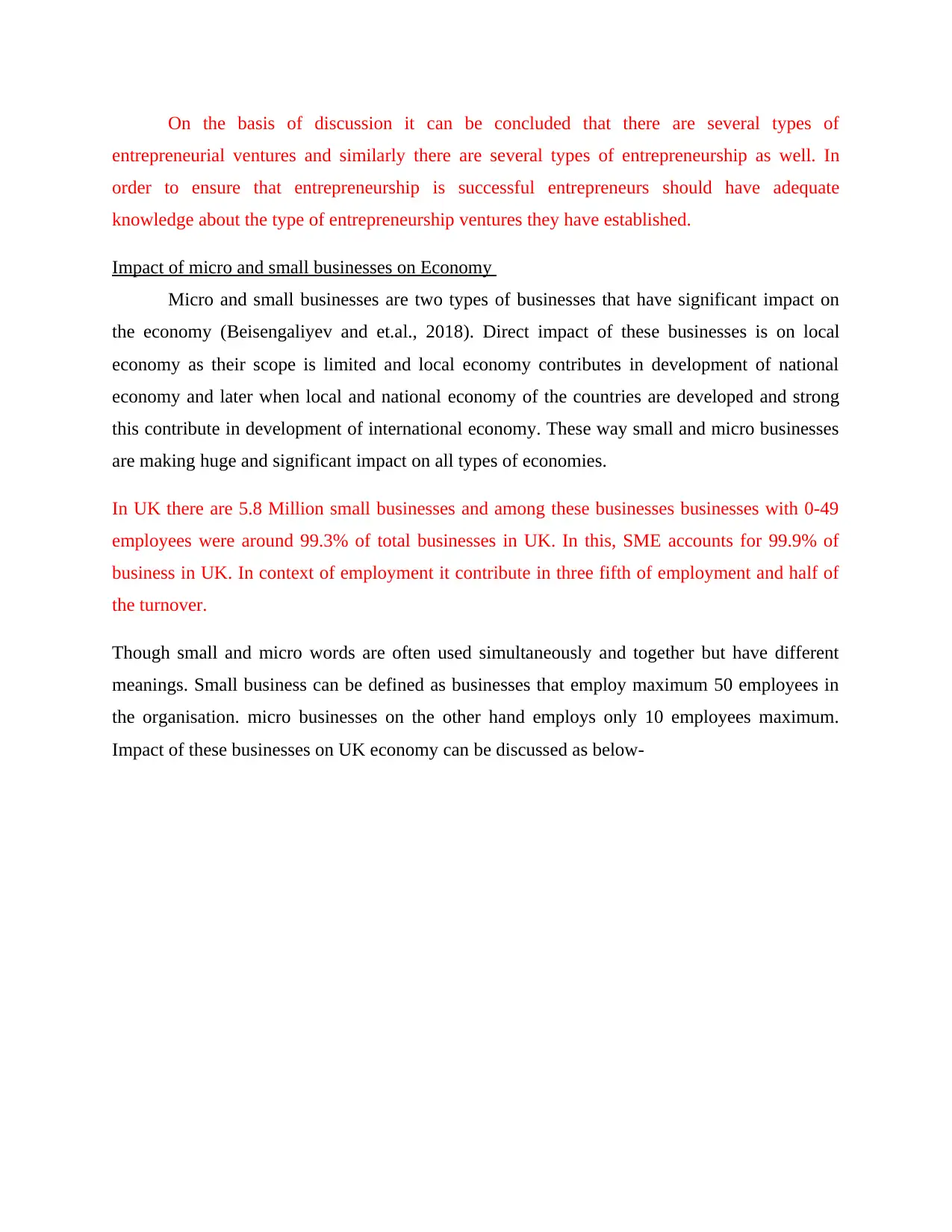
On the basis of discussion it can be concluded that there are several types of
entrepreneurial ventures and similarly there are several types of entrepreneurship as well. In
order to ensure that entrepreneurship is successful entrepreneurs should have adequate
knowledge about the type of entrepreneurship ventures they have established.
Impact of micro and small businesses on Economy
Micro and small businesses are two types of businesses that have significant impact on
the economy (Beisengaliyev and et.al., 2018). Direct impact of these businesses is on local
economy as their scope is limited and local economy contributes in development of national
economy and later when local and national economy of the countries are developed and strong
this contribute in development of international economy. These way small and micro businesses
are making huge and significant impact on all types of economies.
In UK there are 5.8 Million small businesses and among these businesses businesses with 0-49
employees were around 99.3% of total businesses in UK. In this, SME accounts for 99.9% of
business in UK. In context of employment it contribute in three fifth of employment and half of
the turnover.
Though small and micro words are often used simultaneously and together but have different
meanings. Small business can be defined as businesses that employ maximum 50 employees in
the organisation. micro businesses on the other hand employs only 10 employees maximum.
Impact of these businesses on UK economy can be discussed as below-
entrepreneurial ventures and similarly there are several types of entrepreneurship as well. In
order to ensure that entrepreneurship is successful entrepreneurs should have adequate
knowledge about the type of entrepreneurship ventures they have established.
Impact of micro and small businesses on Economy
Micro and small businesses are two types of businesses that have significant impact on
the economy (Beisengaliyev and et.al., 2018). Direct impact of these businesses is on local
economy as their scope is limited and local economy contributes in development of national
economy and later when local and national economy of the countries are developed and strong
this contribute in development of international economy. These way small and micro businesses
are making huge and significant impact on all types of economies.
In UK there are 5.8 Million small businesses and among these businesses businesses with 0-49
employees were around 99.3% of total businesses in UK. In this, SME accounts for 99.9% of
business in UK. In context of employment it contribute in three fifth of employment and half of
the turnover.
Though small and micro words are often used simultaneously and together but have different
meanings. Small business can be defined as businesses that employ maximum 50 employees in
the organisation. micro businesses on the other hand employs only 10 employees maximum.
Impact of these businesses on UK economy can be discussed as below-
Paraphrase This Document
Need a fresh take? Get an instant paraphrase of this document with our AI Paraphraser
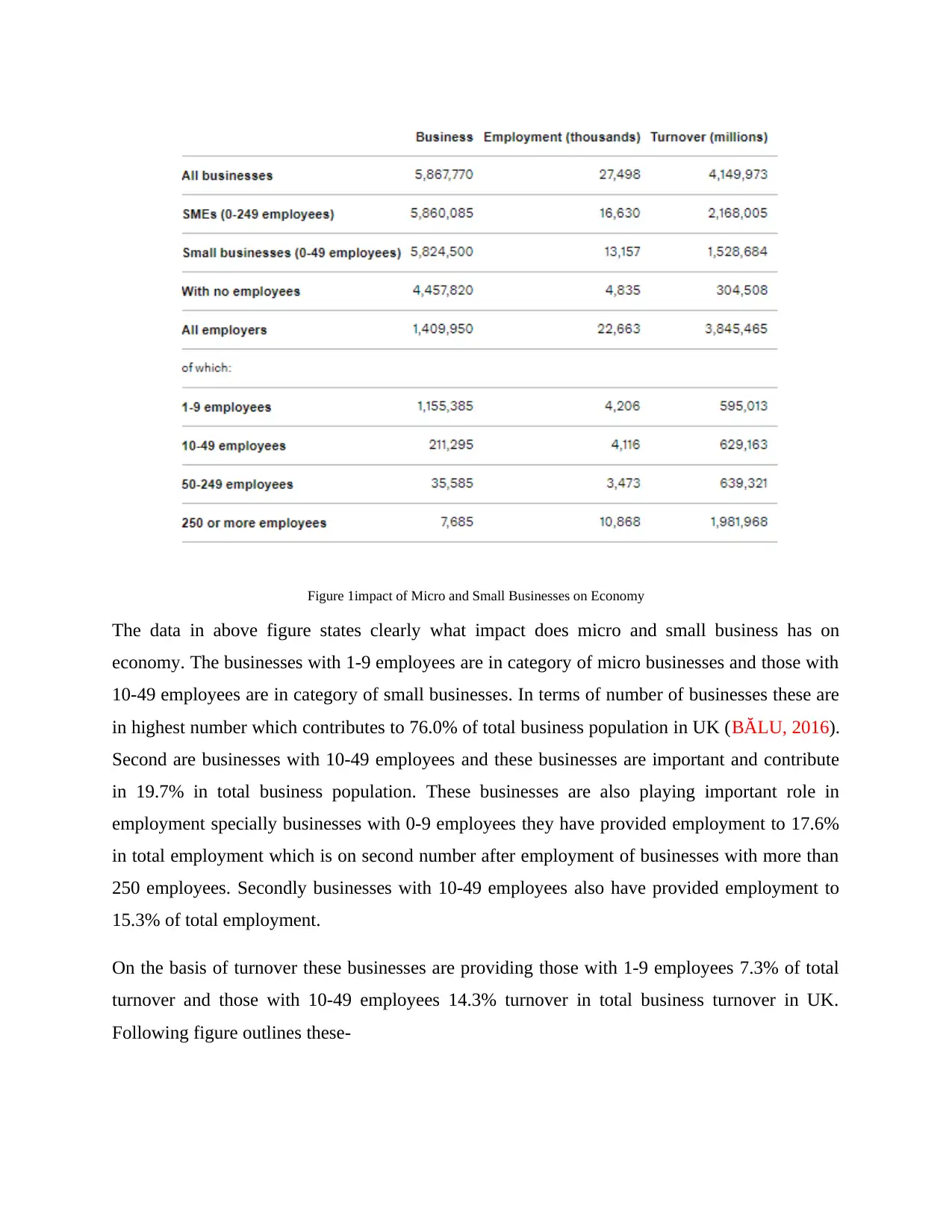
Figure 1impact of Micro and Small Businesses on Economy
The data in above figure states clearly what impact does micro and small business has on
economy. The businesses with 1-9 employees are in category of micro businesses and those with
10-49 employees are in category of small businesses. In terms of number of businesses these are
in highest number which contributes to 76.0% of total business population in UK (BĂLU, 2016).
Second are businesses with 10-49 employees and these businesses are important and contribute
in 19.7% in total business population. These businesses are also playing important role in
employment specially businesses with 0-9 employees they have provided employment to 17.6%
in total employment which is on second number after employment of businesses with more than
250 employees. Secondly businesses with 10-49 employees also have provided employment to
15.3% of total employment.
On the basis of turnover these businesses are providing those with 1-9 employees 7.3% of total
turnover and those with 10-49 employees 14.3% turnover in total business turnover in UK.
Following figure outlines these-
The data in above figure states clearly what impact does micro and small business has on
economy. The businesses with 1-9 employees are in category of micro businesses and those with
10-49 employees are in category of small businesses. In terms of number of businesses these are
in highest number which contributes to 76.0% of total business population in UK (BĂLU, 2016).
Second are businesses with 10-49 employees and these businesses are important and contribute
in 19.7% in total business population. These businesses are also playing important role in
employment specially businesses with 0-9 employees they have provided employment to 17.6%
in total employment which is on second number after employment of businesses with more than
250 employees. Secondly businesses with 10-49 employees also have provided employment to
15.3% of total employment.
On the basis of turnover these businesses are providing those with 1-9 employees 7.3% of total
turnover and those with 10-49 employees 14.3% turnover in total business turnover in UK.
Following figure outlines these-
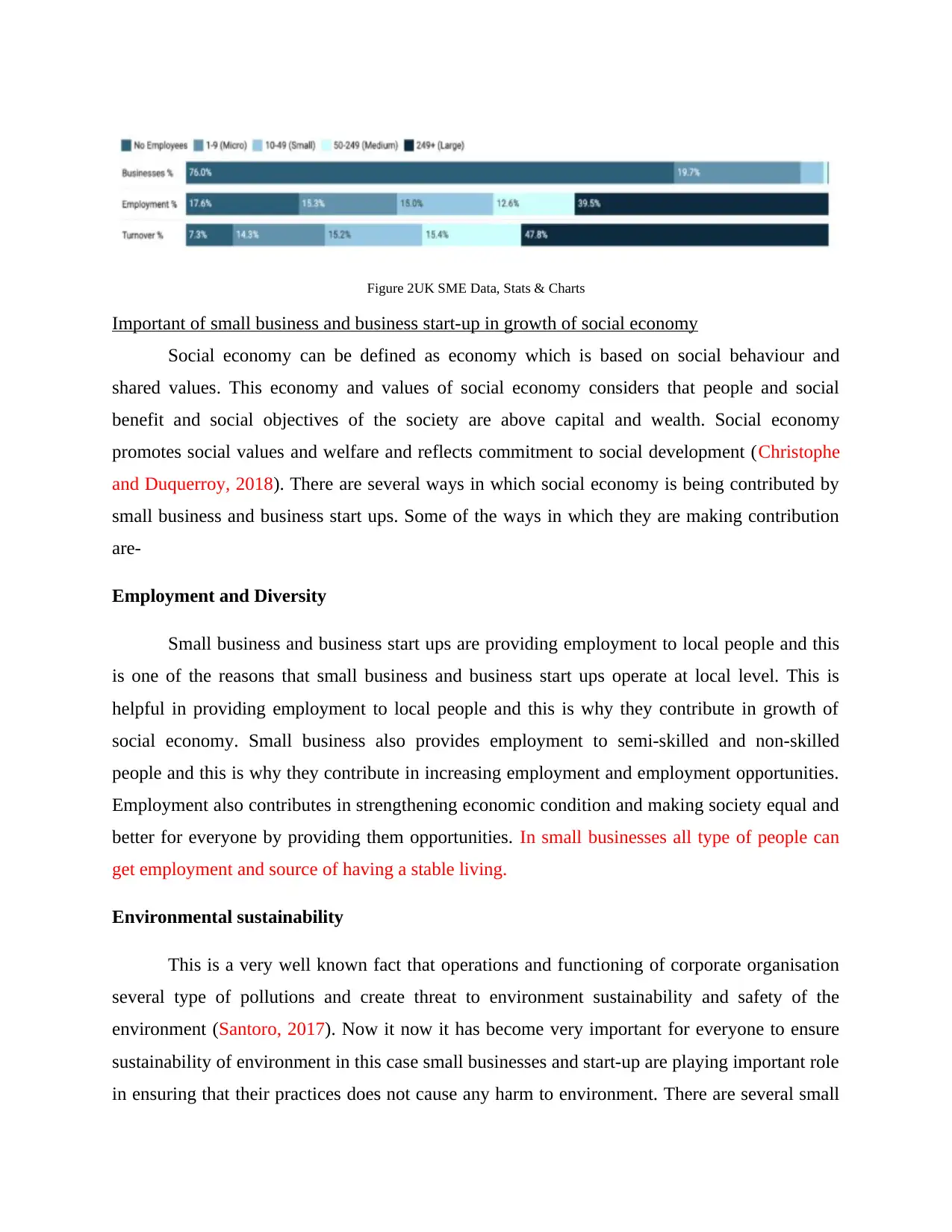
Figure 2UK SME Data, Stats & Charts
Important of small business and business start-up in growth of social economy
Social economy can be defined as economy which is based on social behaviour and
shared values. This economy and values of social economy considers that people and social
benefit and social objectives of the society are above capital and wealth. Social economy
promotes social values and welfare and reflects commitment to social development (Christophe
and Duquerroy, 2018). There are several ways in which social economy is being contributed by
small business and business start ups. Some of the ways in which they are making contribution
are-
Employment and Diversity
Small business and business start ups are providing employment to local people and this
is one of the reasons that small business and business start ups operate at local level. This is
helpful in providing employment to local people and this is why they contribute in growth of
social economy. Small business also provides employment to semi-skilled and non-skilled
people and this is why they contribute in increasing employment and employment opportunities.
Employment also contributes in strengthening economic condition and making society equal and
better for everyone by providing them opportunities. In small businesses all type of people can
get employment and source of having a stable living.
Environmental sustainability
This is a very well known fact that operations and functioning of corporate organisation
several type of pollutions and create threat to environment sustainability and safety of the
environment (Santoro, 2017). Now it now it has become very important for everyone to ensure
sustainability of environment in this case small businesses and start-up are playing important role
in ensuring that their practices does not cause any harm to environment. There are several small
Important of small business and business start-up in growth of social economy
Social economy can be defined as economy which is based on social behaviour and
shared values. This economy and values of social economy considers that people and social
benefit and social objectives of the society are above capital and wealth. Social economy
promotes social values and welfare and reflects commitment to social development (Christophe
and Duquerroy, 2018). There are several ways in which social economy is being contributed by
small business and business start ups. Some of the ways in which they are making contribution
are-
Employment and Diversity
Small business and business start ups are providing employment to local people and this
is one of the reasons that small business and business start ups operate at local level. This is
helpful in providing employment to local people and this is why they contribute in growth of
social economy. Small business also provides employment to semi-skilled and non-skilled
people and this is why they contribute in increasing employment and employment opportunities.
Employment also contributes in strengthening economic condition and making society equal and
better for everyone by providing them opportunities. In small businesses all type of people can
get employment and source of having a stable living.
Environmental sustainability
This is a very well known fact that operations and functioning of corporate organisation
several type of pollutions and create threat to environment sustainability and safety of the
environment (Santoro, 2017). Now it now it has become very important for everyone to ensure
sustainability of environment in this case small businesses and start-up are playing important role
in ensuring that their practices does not cause any harm to environment. There are several small
⊘ This is a preview!⊘
Do you want full access?
Subscribe today to unlock all pages.

Trusted by 1+ million students worldwide
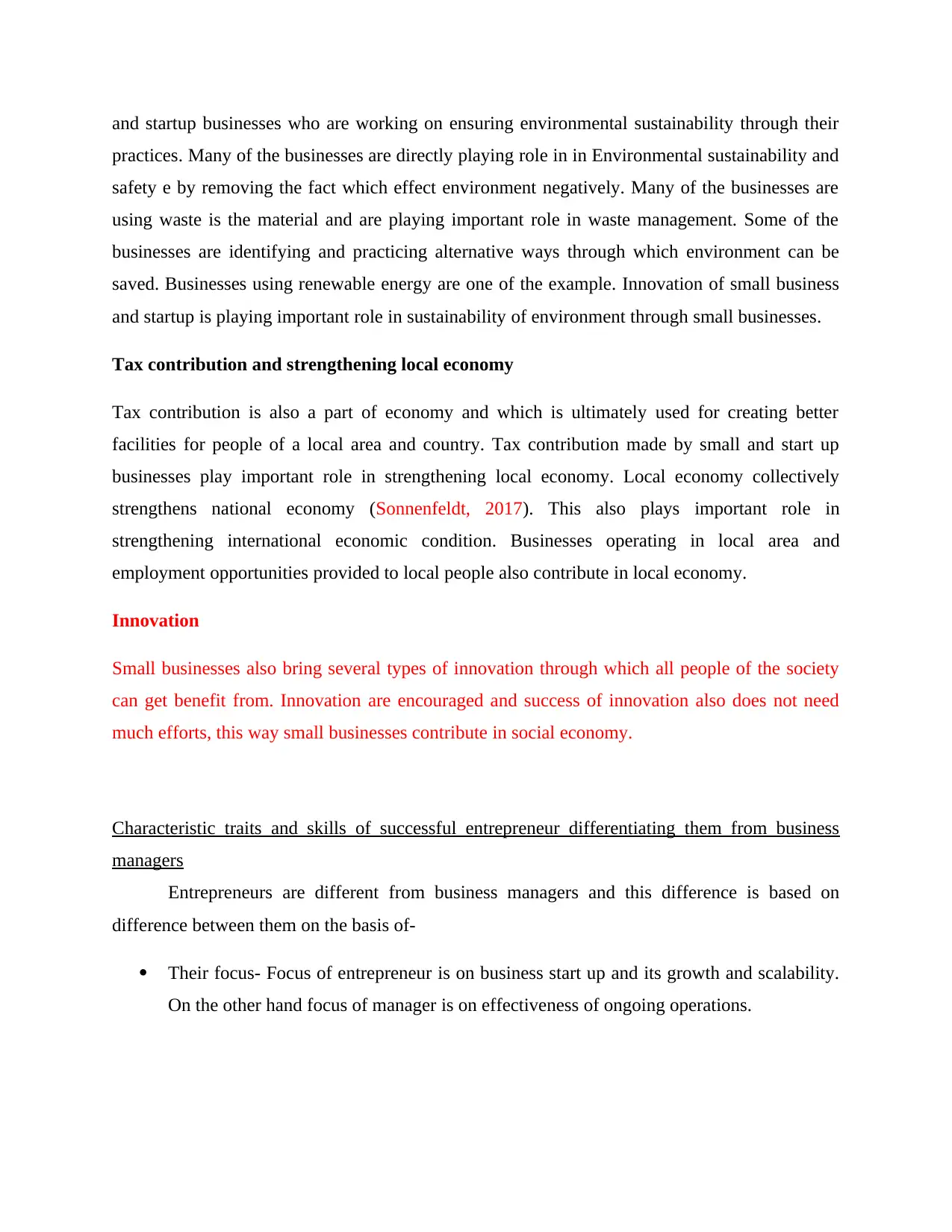
and startup businesses who are working on ensuring environmental sustainability through their
practices. Many of the businesses are directly playing role in in Environmental sustainability and
safety e by removing the fact which effect environment negatively. Many of the businesses are
using waste is the material and are playing important role in waste management. Some of the
businesses are identifying and practicing alternative ways through which environment can be
saved. Businesses using renewable energy are one of the example. Innovation of small business
and startup is playing important role in sustainability of environment through small businesses.
Tax contribution and strengthening local economy
Tax contribution is also a part of economy and which is ultimately used for creating better
facilities for people of a local area and country. Tax contribution made by small and start up
businesses play important role in strengthening local economy. Local economy collectively
strengthens national economy (Sonnenfeldt, 2017). This also plays important role in
strengthening international economic condition. Businesses operating in local area and
employment opportunities provided to local people also contribute in local economy.
Innovation
Small businesses also bring several types of innovation through which all people of the society
can get benefit from. Innovation are encouraged and success of innovation also does not need
much efforts, this way small businesses contribute in social economy.
Characteristic traits and skills of successful entrepreneur differentiating them from business
managers
Entrepreneurs are different from business managers and this difference is based on
difference between them on the basis of-
Their focus- Focus of entrepreneur is on business start up and its growth and scalability.
On the other hand focus of manager is on effectiveness of ongoing operations.
practices. Many of the businesses are directly playing role in in Environmental sustainability and
safety e by removing the fact which effect environment negatively. Many of the businesses are
using waste is the material and are playing important role in waste management. Some of the
businesses are identifying and practicing alternative ways through which environment can be
saved. Businesses using renewable energy are one of the example. Innovation of small business
and startup is playing important role in sustainability of environment through small businesses.
Tax contribution and strengthening local economy
Tax contribution is also a part of economy and which is ultimately used for creating better
facilities for people of a local area and country. Tax contribution made by small and start up
businesses play important role in strengthening local economy. Local economy collectively
strengthens national economy (Sonnenfeldt, 2017). This also plays important role in
strengthening international economic condition. Businesses operating in local area and
employment opportunities provided to local people also contribute in local economy.
Innovation
Small businesses also bring several types of innovation through which all people of the society
can get benefit from. Innovation are encouraged and success of innovation also does not need
much efforts, this way small businesses contribute in social economy.
Characteristic traits and skills of successful entrepreneur differentiating them from business
managers
Entrepreneurs are different from business managers and this difference is based on
difference between them on the basis of-
Their focus- Focus of entrepreneur is on business start up and its growth and scalability.
On the other hand focus of manager is on effectiveness of ongoing operations.
Paraphrase This Document
Need a fresh take? Get an instant paraphrase of this document with our AI Paraphraser
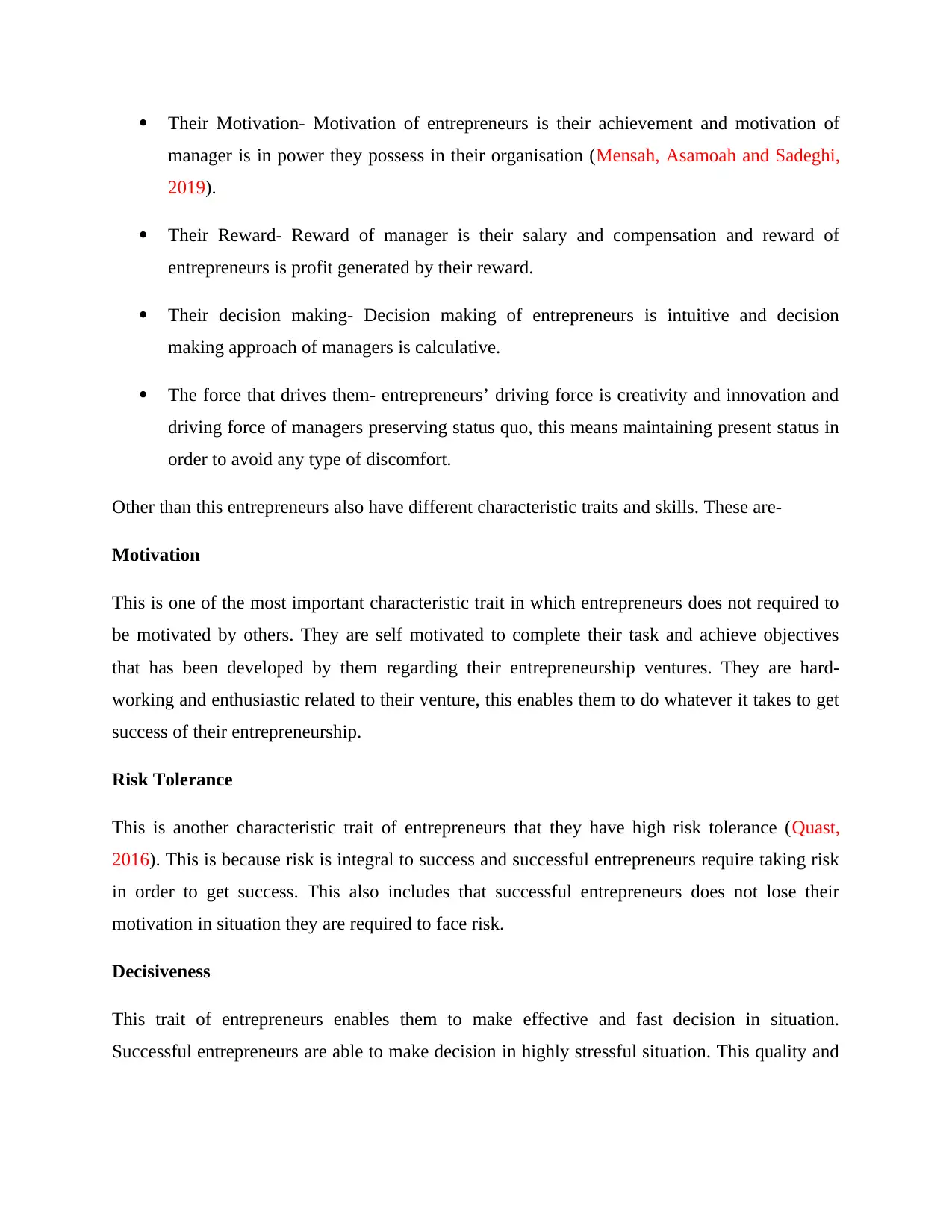
Their Motivation- Motivation of entrepreneurs is their achievement and motivation of
manager is in power they possess in their organisation (Mensah, Asamoah and Sadeghi,
2019).
Their Reward- Reward of manager is their salary and compensation and reward of
entrepreneurs is profit generated by their reward.
Their decision making- Decision making of entrepreneurs is intuitive and decision
making approach of managers is calculative.
The force that drives them- entrepreneurs’ driving force is creativity and innovation and
driving force of managers preserving status quo, this means maintaining present status in
order to avoid any type of discomfort.
Other than this entrepreneurs also have different characteristic traits and skills. These are-
Motivation
This is one of the most important characteristic trait in which entrepreneurs does not required to
be motivated by others. They are self motivated to complete their task and achieve objectives
that has been developed by them regarding their entrepreneurship ventures. They are hard-
working and enthusiastic related to their venture, this enables them to do whatever it takes to get
success of their entrepreneurship.
Risk Tolerance
This is another characteristic trait of entrepreneurs that they have high risk tolerance (Quast,
2016). This is because risk is integral to success and successful entrepreneurs require taking risk
in order to get success. This also includes that successful entrepreneurs does not lose their
motivation in situation they are required to face risk.
Decisiveness
This trait of entrepreneurs enables them to make effective and fast decision in situation.
Successful entrepreneurs are able to make decision in highly stressful situation. This quality and
manager is in power they possess in their organisation (Mensah, Asamoah and Sadeghi,
2019).
Their Reward- Reward of manager is their salary and compensation and reward of
entrepreneurs is profit generated by their reward.
Their decision making- Decision making of entrepreneurs is intuitive and decision
making approach of managers is calculative.
The force that drives them- entrepreneurs’ driving force is creativity and innovation and
driving force of managers preserving status quo, this means maintaining present status in
order to avoid any type of discomfort.
Other than this entrepreneurs also have different characteristic traits and skills. These are-
Motivation
This is one of the most important characteristic trait in which entrepreneurs does not required to
be motivated by others. They are self motivated to complete their task and achieve objectives
that has been developed by them regarding their entrepreneurship ventures. They are hard-
working and enthusiastic related to their venture, this enables them to do whatever it takes to get
success of their entrepreneurship.
Risk Tolerance
This is another characteristic trait of entrepreneurs that they have high risk tolerance (Quast,
2016). This is because risk is integral to success and successful entrepreneurs require taking risk
in order to get success. This also includes that successful entrepreneurs does not lose their
motivation in situation they are required to face risk.
Decisiveness
This trait of entrepreneurs enables them to make effective and fast decision in situation.
Successful entrepreneurs are able to make decision in highly stressful situation. This quality and

trait also includes that entrepreneurs are able to make decision even when information available
to them is limited.
Adaptable
This is another important personality and characteristic trait of successful entrepreneurs that they
are able to get adjusted according to situation and does not get uncomfortable in changing
themselves according to the situation.
People Skills
This is a skill through which successful entrepreneurs are able to influence and motivate others.
There are several reasons because of which this skill is important and successful entrepreneurs
possess this skill (Bosman and Fernhaber, 2018). Entrepreneurs require effective skills to
motivate and inspire employees and people who are working for them and this is also important
while selling the product of the venture.
Interpersonal Skills
This is another important skill which enable individual and facilitate their communication
with other people. Interpersonal skill is important because it also enables to work with others.
This includes communication, listening, understanding other people’s point of view and social
skills which help in socializing. These enable entrepreneurs to effectively socialize and influence
people along with networking with people which are because of so many reasons important for
entrepreneurs.
Skill of thinking strategically
This is one of the skills which refer to the way entrepreneurs think (Cahyani and et.al.,
2018). This means thinking in a way which covers all the areas that will affect decision of the
entrepreneurs.
Reflection of entrepreneurial motivation and mindset through entrepreneurial Personality
Personality is very important aspect which enables individual to reflect what they think
and believe in. This is the reason that mindset and motivation of entrepreneur can be identified
to them is limited.
Adaptable
This is another important personality and characteristic trait of successful entrepreneurs that they
are able to get adjusted according to situation and does not get uncomfortable in changing
themselves according to the situation.
People Skills
This is a skill through which successful entrepreneurs are able to influence and motivate others.
There are several reasons because of which this skill is important and successful entrepreneurs
possess this skill (Bosman and Fernhaber, 2018). Entrepreneurs require effective skills to
motivate and inspire employees and people who are working for them and this is also important
while selling the product of the venture.
Interpersonal Skills
This is another important skill which enable individual and facilitate their communication
with other people. Interpersonal skill is important because it also enables to work with others.
This includes communication, listening, understanding other people’s point of view and social
skills which help in socializing. These enable entrepreneurs to effectively socialize and influence
people along with networking with people which are because of so many reasons important for
entrepreneurs.
Skill of thinking strategically
This is one of the skills which refer to the way entrepreneurs think (Cahyani and et.al.,
2018). This means thinking in a way which covers all the areas that will affect decision of the
entrepreneurs.
Reflection of entrepreneurial motivation and mindset through entrepreneurial Personality
Personality is very important aspect which enables individual to reflect what they think
and believe in. This is the reason that mindset and motivation of entrepreneur can be identified
⊘ This is a preview!⊘
Do you want full access?
Subscribe today to unlock all pages.

Trusted by 1+ million students worldwide
1 out of 18
Related Documents
Your All-in-One AI-Powered Toolkit for Academic Success.
+13062052269
info@desklib.com
Available 24*7 on WhatsApp / Email
![[object Object]](/_next/static/media/star-bottom.7253800d.svg)
Unlock your academic potential
Copyright © 2020–2026 A2Z Services. All Rights Reserved. Developed and managed by ZUCOL.




